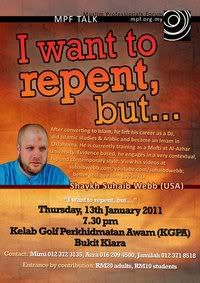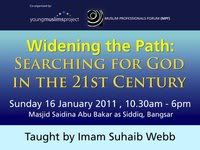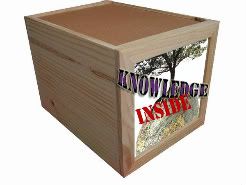Coming from America's Bible Belt to the halls of Al-Azhar, this young imam wants to combine the best of both worlds in Islam.
By Farzina Alam
From Egypt Today
(http://www.egypttoday.com)
Interviewer: Hisham Al-Zoubeir
(http://www.gawaher.com/lofiversion/index.php/t10293.html)
Q: As-salamu `alaykum wa rahmutullahi wa barakatuh. On behalf of DeenPort, thank you very much for agreeing to be interviewed and benefiting our visitors. Could you tell us a bit about your background and how you came to Islam?
A: Before I start, I want to thank the brothers and sisters at DeenPort for this opportunity. I hope our brothers and sisters will take time to utilize DeenPort as a means for increasing their faith and identity.
In my early years I found that my ideas pertaining to God, Prophets and the Unseen were very much in agreement with Islamic principles. However, in my early teens I became frustrated with my inability to find those who shared my ideas. Thus, I turned to a life of crime, drugs; the whole '50 cent Tupaq gangster utopia'. After some time, I became a successful DJ, made a few records and had it, as they say, "Going on."
However, I was very empty on the inside and my heart began to cry out. A great scholar said, "The heart is in need of Allah, more than the stomach is in need of food and drink." Finally, I met some Muslims, asked questions and found myself reading and studying Islam. Al-Hamdulillah, I accepted Islam at the age of twenty after three years of study. I would say the number one motivator for accepting Islam was the Qur'anic message pertaining to the uniqueness of our Creator.
Q: You did not just convert to Islam, but set out to learn the deen. What were your motivations and circumstances for doing so?
A: I would describe my life prior to Islam as out of focus. After investigating Islam the main message that struck me was the focus on Allah. "I have not created the Jinn and humanity except to worship Me." Thus, the more I learned the more I understood that learning was a catalyst towards increasing that focus with Allah. As Ibn Abbas said, "Any thing you learn that fails to increase your khushu' (reverence) for Allah was done so for pride." And Allah says, "Indeed it is only the learned from (Allah's) servants who venerate Allah."
Q: What books have most influenced you and why?
A: I hope that by writing this I will not be labeled. But, inshallah I must be honest.
* The Qur'an and the great work of tafsir by Imam Al-Qurtubi (ra). Also, the recent tafsir of Shaykh Dr. Wahba Al-Zuhayli.
* The Forty ahadith of Imam an-Nawawi (ra) and Ibn Rajab al-Hanbali's (ra) commentary.
* Any book on Maliki and Shafi'i Fiqh. I'm currently reading an interesting explanation of Ibn 'Ashir with a Shaykh.
* Any book related to Nahu, Sarf, Balagha, or poetry. We are currently studying the explanation of Ibn Aqeel in Azhar and I'm really enjoying it.
* The books of hujjat-al Islam (the proof of Islam) Imam Abu Hamid al-Ghazali (ra).
* The Hikam of Ibn Ata'illah al-Iskandari (ra).
* The works of Ibn Qayyim al-Jawziyyah (ra) .
* The works of Ibn Rajab al-Hanbali (ra) .
* The works of the Shaykhul- Islam Sidi Ahmed az-Zarruq (ra).
* The works of Imam Hasan Al-Banna (ra).
* The works of Syed Hawa (ra) .
* The writings and speeches of Malik Al-Shabaaz (Malcolm X) (ra) with a primary focus on
him after his conversion to Ahl-Sunnah.
* The works of Shaykh Abdul Fatah Abu Ghuda (ra).
* The works of Shaykh Dr. Yusuf Al-Qaradawi (May Allah preserve him).
* The works of Shaykh Abdullah Bin Bayyah (May Allah preserve him).
* The works of Shaykh Dr. Ali Jumma' (May Allah preserve him).
* The books of Dr. Tariq Ramadan, particularly 'To be a European Muslim' (May Allah
preserve him)
Q: What people have most influenced you (dead and alive) and why?
A: * The Prophet (saw) and his (saw) companions (ra).
* Fudayl bin 'Iyaad (ra) (x-gangsters love x-gangsters).
* Abu Hamid Al-Ghazali (ra) (never scared to asked questions and move forward).
* Ibn Qayyim al-Jawziyyah (ra) (He was able to combine the best of two great schools).
* Hasan Al-Banna (ra) He has one statement that has always touched me. When asked why
he failed to write a large number of books, he responded, "I wrote men."
* Malik al-Shabaaz (Malcom X) (ra) (It is that x-gangster thing again).
* Jamal Badawi (He is one of the few people who I've seen who lives by his words, may
Allah preserve him).
* Siraj Wahaj (He has always given the youth his time and wise council, may Allah preserve him).
* Amr Khalid (Just listen to his cassette on the love of the Prophet and you'll know why, may
Allah preserve him).
* Shaykh Abdullah Hamoud (one of my teachers from Yemen).
* Shaykh Abu Mustafa (my first sheikh and teacher).
* My father Dr. Webb. (He has an amazing mind and a great work ethic).
* The 'Ulema of Azhar whom I've met since my arrival to Cairo.
A: I left because of my lack of knowledge and reverence for Allah. I found, in the States, that there were many things that I needed to work on inwardly and outwardly. For that reason I decided to set sail and head for Al-Azhar. I chose Al-Azhar because of its respect for traditional sciences with a look towards the future. Unfortunately it has become the habit of the Muslims in the West to blast Al-Azhar; forgetting the hadith of the Prophet, "Speak well or remain silent."
However, I would like to say that Al-Azhar is alive and well. Our program of study, in the high school system, covers 11 subjects including memorization of the Qur'an and Hadith. We study most of the major mutn with the focus being on grammar, rhetoric, and morphology as well as fiqh according to one of our Sunni legal schools. Although I am a Maliki, I study Shafi`i fiqh at al-Azhar itself and Maliki fiqh with an Azhari scholar outside of class time.
Azhar's role in the future of the Ummah is one of great concern. I think the greatest question it is wrestling with is how to take the traditional method of study and apply it to a trans-modern reality? If it can answer that question, then I think with people like Shaykh Ali Jumma' and others, it will continue to impact the Muslim world in a positive way.
Q: What do you think are the major challenges facing Muslims in the 'West', as an American Muslim of the 21st/15th century?
A: I think we face a number of challenges. Since 9/11, however, I think the greatest challenge we are wrestling with is our understanding, application and definition of traditionalism. How is it that a people who live in the most advanced society materially are unable to harness those advances and move forward, and are instead arguing over issues which have remained unsolved by our greatest minds for the last 1000 years? Thus, instead of allowing the dynamics of Islam to push us towards creativity and dynamism, we are still dwelling on issues whose conclusions are many.
I think this is a symptom of our lack of understanding the goals and objectives of our faith, as well as a lack of identity. If we are unable to define ourselves in our current reality, then the only escape is to head towards the past and rehash identity affiliations of days gone by. Thus, instead of realizing our role with our current societies and opening up organizations which will serve as catalyst in spreading our faith, we are busy arguing about the essence of Allah's attributes, the meaning of certain verse of Qur'an, and secondary fiqh issues.
On the other hand we are witnessing a complete rejection of our tradition and the interpretive devices passed down to us in order to answer the challenges of the Trans-Modern reality. Again, this will lead us astray as a people without a past are a people without a future. Thus, and Allah only knows, I think we are going to go through some major growing pains in the next decade and it would be safe to say that all types of extremes will appear within our ranks. Thus, by holding on to our traditions with an eye to the future, we can stay balanced and pass through the difficult storms that lie ahead.
If you look carefully, you've already seen this developing with the recent call for our sisters to take the mantle of Imam. Anyone with a grain of sense would have seen this a long time ago. And if our communities would have answered the simple request of our sisters for better facilities and a say in the community, this current trend would have lost its voice a long time ago. However, our lack of knowledge and inability to synthesize our tradition with our own reality is allowing for more and more of the extreme to have a voice.
My second major concern is that there is a lot of finger pointing within our community as to who is to blame for our current situation. I hope we will come to the realization that there are a large number of factors that lead to the creation of the extremism that has lifted its head amongst our Ummah. Therefore, it is important to criticise each other and offer advice, but I would like to see it done with the correct approach and adab.
Imam ash-Shafi'i (may Allah have mercy upon him) lamented over advice that was given in the public arena in a famous poem. Instead of using newspapers, web sites, and magazines to release worthy frustrations, I would like to see more direct contact and interaction amongst our leaders. Paper and pen can appear very cold, but warm smiles and sincere council can, inshallah, bring hearts together and increase respect.
My last concern, and I'm rambling, so I ask your visitors to excuse me, is that we don't break away from the international Ummah. In trying to define who we are and what we are. Although it is important for us to develop our own identify, it is equally important that in doing so we keep our bridges open with our brothers and sisters from other lands. I'm very concerned that our scholarship might move towards an isolationist mentality and cut the vein of relations with our great scholars in others lands.
On the other side of the coin it would be great if our non-Western Muslim scholars would discuss their ideas about the West with our own scholars before issuing religious rulings in the future. It is well known that the conditions for a fatwa are two:
1. Knowledge of the faith
2. Knowledge of the place
It would be great to see someone like Dr. Sherman Jackson on the European Fatwa Council and Dr. Tariq Ramadan on another. I think that in this current age of globalization and mass communication explosion there is a great opportunity for cross cultural scholarship to develop and have an important impact on the Ummah.







No comments:
Post a Comment